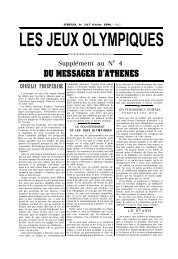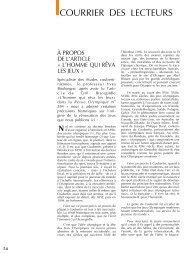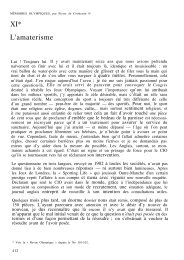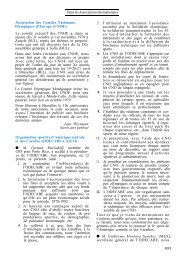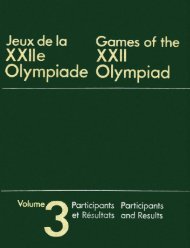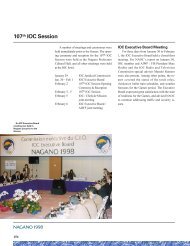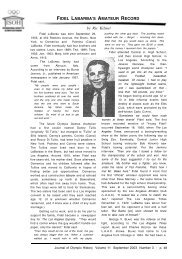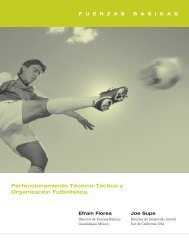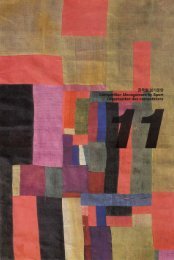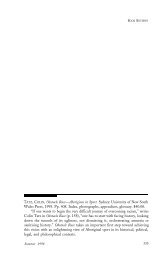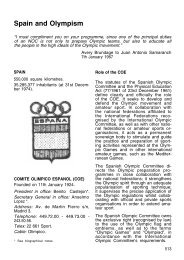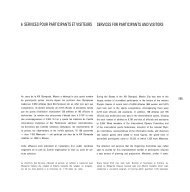Sport Development and Mexican Nationalism - LA84 Foundation
Sport Development and Mexican Nationalism - LA84 Foundation
Sport Development and Mexican Nationalism - LA84 Foundation
You also want an ePaper? Increase the reach of your titles
YUMPU automatically turns print PDFs into web optimized ePapers that Google loves.
Journal of <strong>Sport</strong> History, Vol. 18, No. 3 (Winter, 1991)<br />
boastful when hosting the Pan American Games in 1971; again, the memories<br />
<strong>and</strong> physical plant survive, but caleños today exist amidst pollution, poverty,<br />
crime, violence, <strong>and</strong> fear. And Cali is better than other Colombian cities. 58<br />
Perhaps the most notorious case was the attempt by the Argentine generals<br />
<strong>and</strong> admirals to exploit the 1978 Mundial as a means to divert attention away<br />
from the corruption <strong>and</strong> terror associated with the proceso <strong>and</strong> to claim a right<br />
to rule based on their competency in organizing the event <strong>and</strong> in putting a<br />
winning team on the field. They saved neither themselves nor their nation’s<br />
economy. 59 Finally, given the dwindling size of the global “socialist” community,<br />
Fidel Castro was well prepared to manipulate the 1991 Pan American<br />
Games in Havana to refurbish his image at home <strong>and</strong> abroad <strong>and</strong> to bring dollars<br />
into his sagging economy. 60<br />
Empatados? (Being a Form of Conclusion)<br />
The conduct of <strong>Mexican</strong> sports policy since 1920 may have made some<br />
citizens healthier, happier, <strong>and</strong> even prouder to be <strong>Mexican</strong>s. And in so doing it<br />
may have made it easier for <strong>Mexican</strong>s to laugh at life, its adversity <strong>and</strong> despair. 61<br />
However, it has not contributed significantly to overcoming those much deeper<br />
problems <strong>and</strong> characteristics which, according to Roger Bartra, keep <strong>Mexican</strong><br />
nationalism in crisis even today. 62 Nevertheless, in Mexico, as elsewhere in<br />
Latin America, leaders in politics, education, <strong>and</strong> public health, regardless of<br />
ideology, will surely continue to presume to find in sport a mechanism for<br />
achieving their respective goals, usually sung to the tune of el himno nacional<br />
[the national anthem] . 63<br />
?<br />
58. Alfonso Bonilla Aragón, et al., Cali Panamericana (Cali: Carvajal & Cía., 1971), 2 vols; Alberto Galvis<br />
Ramírez, “El aconticimiento de1 siglo (l),” Deporte Gráfico (Bogota), No. 15 (July 1991): 34-36.<br />
59. On the ambivalent emotions <strong>and</strong> political implications surrounding the 1978 Mundial in Argentina, see<br />
Joseph L. Arbena, “Generals <strong>and</strong> Goles: Assessing the Connection Between the Military <strong>and</strong> Soccer in<br />
Argentina,” The International Journal of the History of <strong>Sport</strong> 7 (May 1990): 120-130. Also, Osvaldo Bayer,<br />
Fútbol argentino (Buenos Aires: Editorial Sudamericana, 1990).<br />
60. Steve Wulf, “Running on Empty,” <strong>Sport</strong>s Illustrated 75 (May 21, 1990): 42-47.<br />
61. James W. Wilkie, “First-Class Stereotypes: Conversations on Delta LAX-MEX, 1988,” New World: A<br />
Journal of Latin American Studies 3 (1988-1989): 1-8. A long-time <strong>Mexican</strong> sportswriter contends that the<br />
purpose of soccer is “to provoke in the masses a shout which brings them happiness <strong>and</strong> momentary escape from<br />
this world,” though the quality of play in Mexico has not always lived up to expectations; see Manuel Seyde, La<br />
fiesta de1 alarido y las Copas de1 Mundo (Mexico, D.F.: Litográfica Cultural, 1984), p. 253 for quote.<br />
62. Roger Bartra, “La crisis de1 nacionalismo en México,” Revista <strong>Mexican</strong>a de Sociología 51<br />
(July-September 1989): 181-220. Frey similarly concludes that the impact of sport on overall development,<br />
including the growth of nationalism, is likely to be “short-term, superficial, <strong>and</strong> superfluous”; see Frey, ‘The<br />
Internal <strong>and</strong> External Role of <strong>Sport</strong>,” 79.<br />
63. Joseph L. Arbena discusses the role of sport across Latin American history in both promoting <strong>and</strong><br />
retarding social change in “Deporte y cambio social en America Latina,” Pretextos I (August 1990): 77-90.<br />
Additional sources on all aspects of <strong>Mexican</strong> sport are cited in Joseph L. Arbena, camp., An Annotated<br />
Bibliography of Latin American <strong>Sport</strong>: Pre-conquest to the Present (Westport, CT: Greenwood Press, 1989).<br />
364



